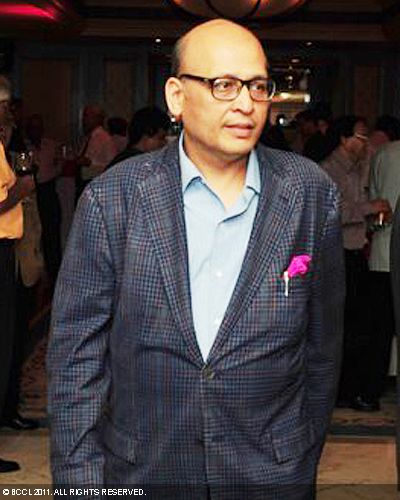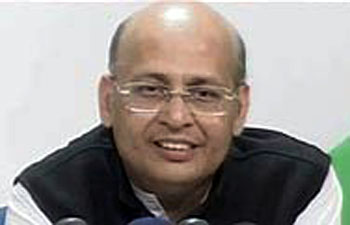Abhishek Manu Singhvi Biography
Abhishek Manu Singhvi (born 24 February 1959) is an Indian politician belonging to Indian National Congress party, he is also a Member of the Parliament of India representing Rajasthan in the Rajya Sabha, the upper house of the Indian Parliament. He was formerly the spokesperson of the Congress party. On April 23, 2012 he quit as the Chairperson of Parliament Standing Committee on Law and Justice and also resigned as Congress spokesperson due to allegations of personal indiscretion.Dr Abhishek Singhvi is an eminent jurist, parliamentarian, visible media personality, well known columnist, author and commentator. He is a Member of Parliament; the senior most National Spokesperson of the Congress Party; the youngest designated Senior Advocate, Supreme Court (at age 34); a former and youngest Additional Solicitor General of India (ASG) (at 37) and former elected Vice President, Supreme Court Bar Association. He is currently the Chairman of the AICC All India Law and Human Rights Department and Chairman, Parliamentary Committee on Law, Justice, and Personnel & Grievances. He was formerly Vice Chairman of Congress’ Media Department.
EDUCATION
B.A.(Hons.), M.A., Ph.D., PIL Educated at St. Columba’s School, Delhi, St. Stephen’s College, Delhi University, Trinity College, University of Cambridge, U.K. and Havard University, U.S.A.He topped India at the school leaving Indian School Certificate exam and did BA Economics Hons, St Stephen’s College, and MA and PhD from Trinity College, Cambridge, UK. Abhishek Manu Singhvi also taught at St. John’s College, Cambridge and did a summer program, PIL, from Harvard, USA. He has lectured to student/faculty groups and general audiences at Stanford, Harvard, Yale, Boston MIT and George Washington Universities, to NGOs and think tanks (like Heritage Foundation, International Council of World Affairs in Washington, DC, USA) and addressed several international conferences, including those at Paris and Pakistan. He was conferred honorary Doctor of Laws degrees from Amity, Rajasthan and Jain Viswa Bharati Universities. He is visiting Trumbull Lecturer at Yale University, USA in 2011.Constitutional law, administrative law, corporate law, commercial law and international commercial arbitrations are his special areas of professional interest. He has been a member of the Supreme Court created and administered bilateral legal forums, including the Indo British, Indo US, Indo Canadian and Indo Israel ones.
PERSONAL LIFE AND FAMILY
Dr. Abhishek Manu Singhvi son of Dr. Laxmi Mall Singhvi and Shrimati Kamla Singhvi born on 24/02/1959 his birth place is Jodhpur (Rajasthan) he is married to Shrimati Anita Singhvi having Two Sons.His interests include reading biographies, Hindi film music, watching action thrillers and travel.His association with the media has been noted since a long time, with the help of his expression force and communication through his amusing and humorous, self-possessed non emotional conversational talks. It wasn’t a child’s play to snare and trap the political leader cum keen author in the media’s discussions due to his sermon and speech when articulated cleared about his deep thoughts and expressions about any given topic, be it current or what happened off late! Dr Abhishek Manu Singhvi reflects his stature of being an attractive source to the dynamic and ever-popular televised urban privileged and influential class of the society.
POSITIONS HELD
1997-98 Additional Solicitor General of India 2001 onwards National Spokesperson, Indian National Congress April 2006 Elected to Rajya Sabha Aug. 2006 – May 2009 and Aug. 2009-July 2011 Member, Committee on Personnel, Public Grievances, Law and Justice Aug. 2006 – Aug. 2007 Member, Joint Committee on Offices of Profit Member, Joint Committee to examine the Constitutional and Legal position relating to Office of Profit Member, Consultative Committee for the Ministry of Urban Development Sept. 2006 – Sept. 2010 Member, Committee of Privileges July 2010 onwards Member, Consultative Committee for the Ministry of External Affairs July 2011 onwards Chairman, Committee on Personnel, Public Grievances, Law and Justice Member, General Purposes Committee.
Abhishek Manu Singhvi is an eminent personality in the Indian Political Scenario. He belongs to the Indian National Congress and is also a Member of the Parliament of India representing Rajasthan in the Rajya Sabha. Having acknowledged by the Global Leader of Tomorrow Award in 1999, he has been an actively inspiring role model for the youngsters. In 2007, he was invited to hold lectures on Federalism which was printed in the prominent and esteemed IIPA journal apart from the best essay.Dr Abhishek Manu Singhvi reflects his stature of being an attractive source to the dynamic and ever-popular televised urban privileged and influential class of the society.Abhishek Manu Singhvi has constantly been a source of inspiration and motivation for the youth. His communication skills have also led to him take lecture in eminent universities. He is an active communicator with a good sense of humour which influences the youth to a great extent.
Abhishek Manu Singhvi is of the view that people are always born with a silver spoon, however if they do not fight hard to prove themselves in whatever career they choose, then they would get rejected in fraction of seconds by the society. He says, “The actual test of a person’s potential gradient comes to test, when they start to perform”. Abhishek Manu Singhvi cites his own example that how confused he was when he had to choose a field but at that point of time his father became his inspiration and gave him courage.
Abhishek Manu Singhvi’s association with the media has been noted since a long time, with the help of his expression force and communication through his amusing and humorous, self-possessed non emotional conversational talks. Dr.Abhishek Manu Singhvi contribution in media includes the ‘Candid Corner’, a column written by him in Hindustan Times which are also published in a book form. Dr Abhishek Manu Singhvi reflects his stature of being an attractive source to the dynamic and ever-popular televised urban privileged and influential class of the society.

